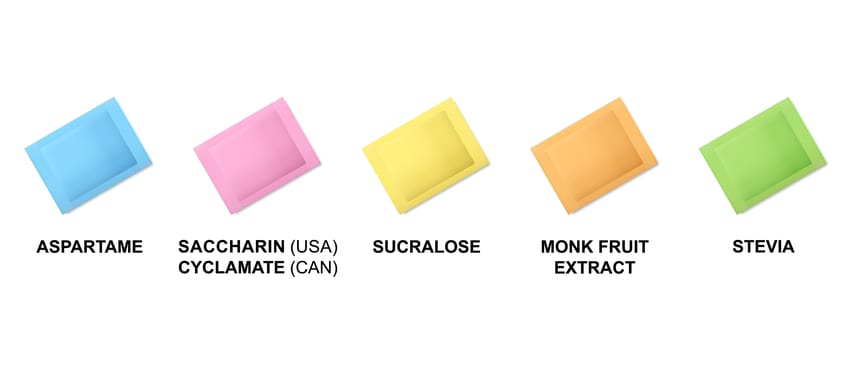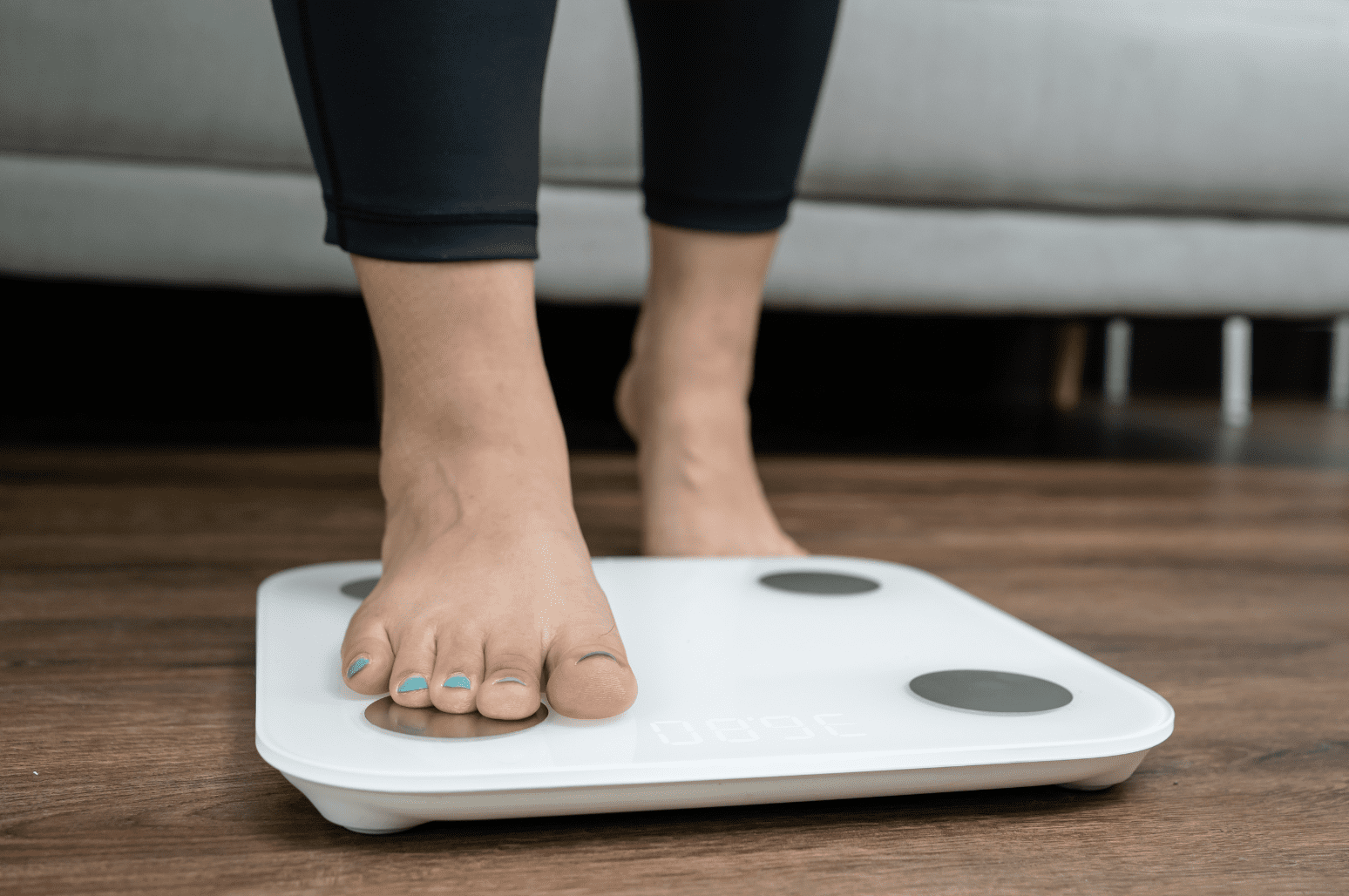
Saccharin is an artificial sweetener and sugar alternative that’s been used to sweeten foods for over 100 years. In the 60s and 70s, the popularity of saccharin surged. Some claim saccharin can be beneficial for weight loss, diabetes, and more, and others raise concerns about the safety of all artificial sweeteners, including saccharin.
How is Saccharin made?
Saccharin is a white powdery substance made in a lab by oxidizing the chemicals phthalic anhydride or o-toluene sulfonamide. Since it doesn’t contain carbs or calories, it’s often used as a sugar alternative. Saccharin leaves your body unchanged because humans can’t break it down.
This artificial sweetener is around 300-400 times sweeter than sugar, so you don’t need much to achieve a sweet taste. Some people say it has a bitter, unpleasant aftertaste, so it’s often combined with other low-calorie sweeteners like aspartame.
Food manufacturers choose saccharin because it’s fairly stable, has a long shelf life, and can be consumed even years after storage. Saccharin is used in some medicines and to sweeten carbonated diet drinks and sodas, and other low-calorie foods like candies, cookies, and jams.

Is Saccharin Safe?
Most large health organizations and authorities, such as the World Health Organization (WHO) and the Food and Drug Administration (FDA), state saccharin is safe for human consumption. Other health experts and advocates disagree and raise concerns about the long-term safety of saccharin.
Several animal studies in the 1970’s associated saccharin with the development of bladder cancer [1]. Despite it being classified as possibly cancerous to humans, further research failed to solidify this connection in humans. More research is needed on the long-term safety of saccharin. Observational human studies showed no clear association between cancer risk and saccharin consumption [2] [3].
Due to a lack of evidence, the classification was changed to ‘not classifiable as cancerous to humans’ [4]. Some health experts still recommend avoiding saccharin and feel observational studies aren’t strong enough to rule out an increased cancer risk with saccharin consumption.
While it is true that replacing sugar with a low-calorie sweetener might benefit weight loss, if you’re wary of artificial sweeteners in general, you can choose other more natural, keto-friendly sugar replacements, such as stevia and monk fruit [5].
Some studies show artificial sweeteners might increase weight gain, food intake, and hunger [6] [7] [8].

Where Can You Find Saccharin?
Saccharin is used as a table sweetener sold under the brand names Sweet ‘N Low, Necta Sweet, and Sweet Twin. It’s found in a range of diet foods and drinks, baked goods, jams, jelly, canned fruit, candy, dessert toppings, and chewing gum.
Saccharin is in plenty of artificially sweetened drinks, but the FDA restricts the amount to no more than 12mg per fluid ounce. In the European Union, you can identify saccharin on food product labels as E954.
You can find saccharin in granule or liquid form. The sweetness of one serving is comparable to two teaspoons of sugar.
When saccharin was banned in the 1970s, lots of diet drink manufacturers switched to aspartame and continue to use aspartame today.
You can also find saccharin in non-food items like mouthwash, toothpaste, medicines, and pharmaceuticals.
What About Blood Sugar?
Saccharin isn’t metabolized by the body and doesn’t affect blood sugar the same way refined sugar does. While there aren’t many studies on the effects of this sweetener alone on blood sugar levels, several studies examined the effects of other artificial sweeteners.
For example, one study of 128 people with type 2 diabetes revealed consuming the artificial sweetener Splenda (sucralose) didn’t affect blood sugar levels [9]. The same result occurred in studies of other artificial sweeteners like aspartame [10] [11].
Most evidence suggests artificial sweeteners don’t significantly affect blood sugar levels in diabetics or healthy people [12]. It’s unlikely saccharin affects long-term blood sugar control in those with diabetes or healthy people, but every individual is different, so you might want to check your blood sugar levels after consuming saccharin to check your response.
How Much Should You Eat?
The FDA states adults and children can consume up to 2.3mg of saccharin per pound (5mg per kilogram) of body weight without risk.
Should You Include Saccharin in Your Ketogenic Diet?
It’s up to you if you’d like to include this sweetener in your ketogenic diet. Opinions and recommendations fall on all sides of the spectrum.
Listen to your body and see how you feel after eating a product sweetened with it. You might decide you prefer other keto-approved sugar alternatives like erythritol, stevia, or monk fruit.
Do You Consume Saccharin on Your Ketogenic Diet?
What are your thoughts on consuming artificial sweeteners on keto?
References
Price, J. M., Biava, C. G., Oser, B. L., Vogin, E. E., Steinfeld, J., & Ley, H. L. (1970). Bladder tumors in rats fed cyclohexylamine or high doses of a mixture of cyclamate and saccharin. Science, 167(3921), 1131-1132. DOI: 10.1126/science.167.3921.1131
Weihrauch, M. R., & Diehl, V. (2004). Artificial sweeteners: Do they bear a carcinogenic risk? Ann Oncol, 15(10), 1460-1465. DOI: 10.1093/annonc/mdh256
Morgan, R. W., & Wong, O. (1985). A review of epidemiological studies on artificial sweeteners and bladder cancer. Food Chem Toxicol, 23(4-5), 529-533. DOI: 10.1016/0278-6915(85)90147-4
Touyz, L. Z. G. (2011). Saccharin deemed ‘not hazardous’ in United States and abroad. Curr Oncol, 18(5), 213-214. DOI: 10.3747/co.v18i5.836
Bellisle, F. & Drewnowski, A. (2007). Intense sweeteners, energy intake, and the control of body weight. European Journal of Clinical Nutrition, 61(6), 691-700. DOI: 10.1038/sj.ejcn.1602649
Fowler, S. P., Williams, K., Resendez, R. G., Hunt, K. J., Hazuda, H. P., & Stern, M. P. (2008). Fueling the obesity epidemic? Artificially sweetened beverage use and long-term weight gain. Obesity (Silver Spring), 16(8), 1894-1900. DOI: 10.1038/oby.2008.284
Rogers, P. J., & Blundell, J. E. (1989). Separating the actions of sweetness and calories: Effects of saccharin and carbohydrates on hunger and food intake in human subjects. Physiol Behav, 45(6), 1093-1099. DOI: 10.1016/0031-9384(89)90093-0
Stellman, S. D., & Garfinkel, L. (1986). Artificial sweetener use and one-year weight change among women. Prev Med, 15(2), 195-202. DOI: 10.1016/0091-7435(86)90089-7
Grotz, V. L., Henry, R. R., McGill, J. B., Prince, M. J., Shamoon, H., Trout, J. R., Pi-Sunyer, F. X. (2003). Lack of effect of sucralose on glucose homeostasis in subjects with type 2 diabetes. J Am Diet Assoc, 103(12), 1607-1612. DOI: 10.1016/j.jada.2003.09.021
Colagiuri, S., Miller, J. J., & Edwards, R. A. (1989). Metabolic effects of adding sucrose and aspartame to the diet of subjects with noninsulin-dependent diabetes mellitus. 50(3), 474-478. DOI: 10.1093/ajcn/50.3.474
Nehrling, J. K., Kobe, P., McLane, M. P., Olson, R. E., Kamath, S., & Horwitz, D. L. (1985). Aspartame use by persons with diabetes. Diabetes, Care, 8(5), 415-417. DOI: 10.2337/diacare.8.5.415
Bruyere, O., Ahmed, S. H., Atlan, C., Belegaud, J., Bortolotti, M., Canivenc-Lavier, M-C., Charriere, S., Girardet, J-P., Houdart, S., Kalonji, E., Nadaud, P., Rajas, F., Slama, G., & Margaritas, I. (2015). Review of the nutritional benefits and risks related to intense sweeteners. Arch Public Health, 73, 41. DOI: 10.1186/s13690-015-0092-x









